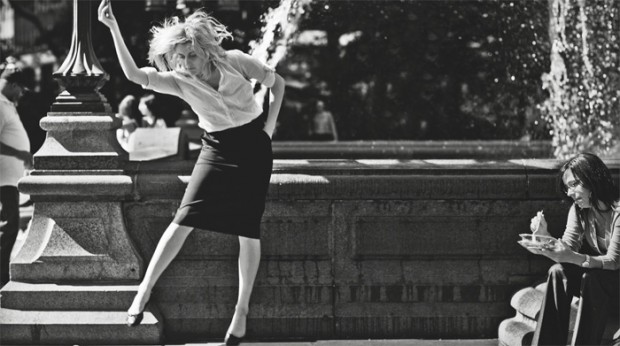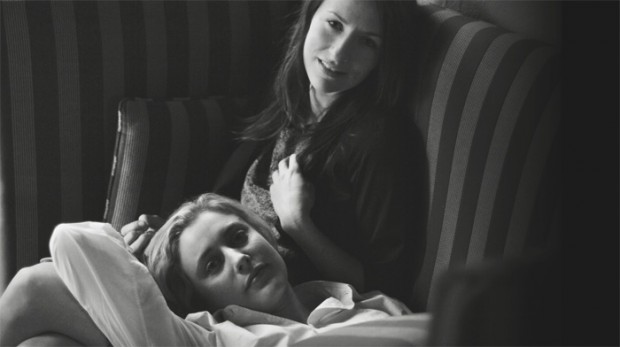A Noah Baumbach film through and through, I can’t help but praise lead actress and co-writer Greta Gerwig‘s influence in making Frances Ha the quirky, subtly hilarious portrait of a twentysomething refusing to accept she is overdue for adulthood that it is. When her titular Frances unabashedly apologizes for “not being a real person,” the hyperbolic exclamation isn’t far off the mark. Living to have fun while hoping life will ultimately fall into place, the realization it’s only passing her by leads to a quarter-life crisis of identity and purpose. Rather than dreaming of the future, Frances is content to live in the happy-go-lucky past that all those she shared it with have begun to leave behind.
If the start were any indication, you’d assume the film would portray the wild and giddily obnoxious platonic pairing of Frances and best friend Sophie (Mickey Sumner) for the duration. Thankfully, however, Baumbach and Gerwig realized that a constant barrage of this eccentric duo would ill serve the plot’s goal of allowing an evolution of character. Frances will need a vessel for responsibility with which to contrast herself against—a woman to be jealous of and sad for at the same time. A child at heart, our lead is the iconically endearing, selfishly-entitled creature we have come to expect from Baumbach’s menagerie of animals. Oblivious to that truth, she takes it as a personal slight when anyone tries to alter the vacuum-sealed existence she adores.

It’s a persona Gerwig explained post-screening that escaped during the writing process as though always inside yet is not actually her. An unsurprising admission, she excels in Frances’ shortcomings and bubbly naiveté by fully embodying the character to great effect. Quick to make friends, the running gag of the film becomes her ever-evolving string of addresses and ability to never be homeless. If not Sophie’s “same person with different hair”, it’s Benji’s (Michael Zegen) just as goofy ‘undateable’ chum, Grace Gummer’s complete polar opposite, her real life Mom and Dad, or unlikely locations of past and future which shouldn’t be a part of her present. Chipper through it all, though, she can get by on her charms as long as the roommate understands the flakiness coming with package.
Shot in black and white, the aesthetic intriguingly allows for the performances to stand out without the distraction of lit-up New York City locations. These larger-than-life characters are colorful enough, living within their heightened states of self-awareness and in flux positions. Sophie has a career and boyfriend (Patrick Heusinger‘s Patch) to juggle, Benji the myriad opportunities of so-called friends in the know, and Miles (Adam Driver) a new female conquest nightly—the trio receiving Frances opinion intrusions regularly. Like most lost people in the world, she’s full of ideas on how others can improve themselves but barren when it comes to herself. Desperately attempting to earn a spot in the dance company she apprentices for, the prospect of doing anything else is seen as beneath her capabilities and therefore an unnecessary goal.

This all or nothing mentality ends up getting her a whole lot of nothing. Those rare occasions when she’s in the black, however, do uncover her capacity for giving everything she can to those she loves. And if a barrier gets in her way she will run halfway across town to an ATM while on a dinner date or whip up some omelets when the crew is feeling like being served. Frances has a giant heart and a propensity for failure, a mixture constantly showing a smile where exasperation should reside. Joking, laughing, and caring for anyone who needs it, you want her to succeed as though she’s your little sister trapped in a fantasy world without an exit. Sometimes life needs to be harsh for you to understand the gifts it can wield.
Her friends, family, and dance teacher all love her company and believe she can do so much, but Frances needs to see it too. Bad timing and crossed signals have been the bane of her existence for so long that she’s forgotten what a win feels like. This makes taking chances an impossibility as a desire to stop failing overpowers the one to try. So we laugh and cry as petty arguments risk destroying tightly knit bonds and roll our eyes when she’s blatantly lying through her teeth. And through it all is Frances’ warped sense of humor making fake fights in the park normal and lazy days on the couch a welcome reprieve from the exercising she’s told herself she’ll do.

A biting sarcasm never shown without a smile, we fall in love with her sense of humor and unwavering ability to be an original. Her ups and downs mirror our own and we begin to fondly reminisce about when we too stubbornly refused to morph into the older, more responsible version of who we were in simpler times. Frances embodies that moment when uncertain dreams must be reconciled with actual execution; where the person we thought we’d become justifiably dies so the one we can and should be is allowed to enter the world with all the confidence and success deserved. A coming-of-age story for the emotionally stunted, Frances Ha delights.
Frances Ha is now in playing at TIFF.


